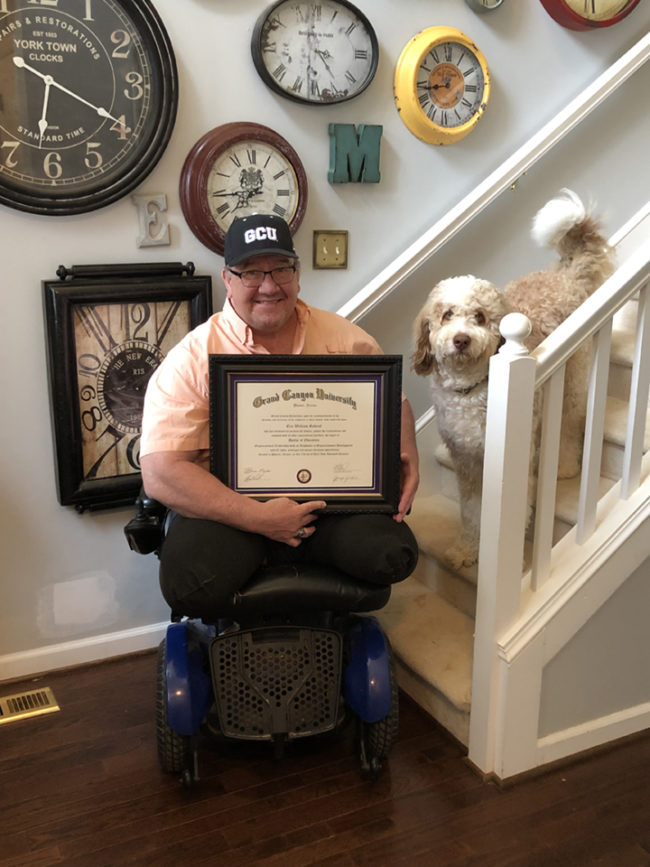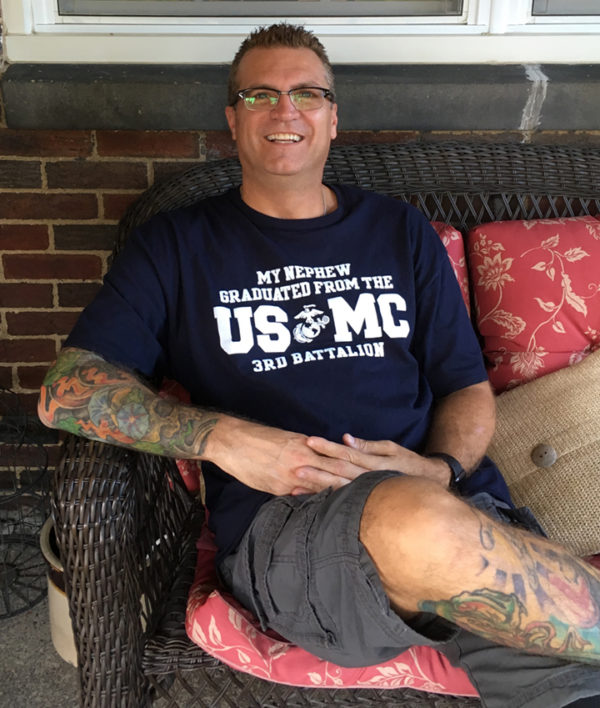By Andrea Spridgen
One of the many adjustments you may have to make after losing a limb is finding new employment and that may involve going back to school and learning new skills. In fact, losing a limb may be the catalyst that leads you to embrace the challenge of a career path you’ve always wanted to pursue.
Today more than ever, there are a variety of options to pursue higher education, and if you are looking to earn a degree, get a second degree in another field, or earn an advanced degree, online education may be the right choice.
While earning a degree online is not for everyone, it may offer benefits that are especially helpful for you as an amputee.
BENEFITS OF ONLINE EDUCATION

FLEXIBILITY
Unlike traditional on-campus programs, online college programs are typically asynchronous learning environments. You do not have to attend class at a set day and time like you would a campus-based class. Because you can log in to the learning portal at any time to complete assignments, post in discussion forums, and take tests, the online format will give you more freedom to work around your schedule.
The structure of the classes can vary by school. For example, there may be a specific time window, such as between Monday at 9 a.m. and Saturday at midnight, that assignments and discussion posts for a particular learning unit must be completed. Or if it is a self-paced program, you can complete courses at your own pace. There is usually a timeframe in which all courses in the program must be completed, however—commonly six to 12 months.
The flexibility of online education can be particularly advantageous for you if you are still attending physical therapy sessions or have multiple medical appointments you need to schedule around. The flexible schedule is also helpful if you have additional health challenges or have to manage pain or fatigue flare-ups that can keep you out of action for the day. If you have a family, it’s also helpful to be able to attend class after the kids are in bed.
77% of higher education students believe an online education is better than, or equal to, an on-campus education.
2019 Online Education Trends Report, bestcolleges.com
LOCATION, LOCATION, LOCATION
This mantra, so often repeated in the real estate world, is no less true with online education. With online programs, you are free to take classes wherever you want. Your living room, the library, your kitchen table, or your backyard.
While this convenience can be appealing regardless of your circumstances, if you have a lower-limb amputation, it can significantly reduce the energy expended to get to and sit through classes. There are no worries about having to rush to make it across campus for classes scheduled too closely together—just navigate to your next class with a click of your mouse.

Although all colleges are required to meet accessibility requirements as outlined in the Americans with Disabilities Act, accessible and convenient are very different things. If you use a wheelchair, navigating hallways, crowded doorways, and between buildings can still be quite cumbersome on a physical campus, not to mention the fall risk associated with maneuvering on slick surfaces in inclement weather while using a prosthesis.
FREEDOM TO BE YOU ON YOUR TERMS
The freedom to interact with other students and professors online rather than in person may help you to be more confident since you can choose what to disclose about your limb loss and when, depending on your personal comfort level. Whether you are ready to show your prosthesis or residual limb or prefer not to talk about it with strangers, it’s entirely up to you. Your ideas, not your physical conditions, are all that are visible.
In 2017, one of every six students engaged in post-secondary education was enrolled exclusively in online courses.
2017 NCES Report, U.S. Department of Education
OPPORTUNITY
If you are unable to return to your previous job after amputation, education can help you transition to a new career and open up economic opportunities. According to a report by the U.S. Department of Labor Bureau of Labor Statistics, in 2018 the unemployment percentage of people with a disability was more than twice that of those without a disability. People with a disability were also less likely to have completed a bachelor’s degree. But people who completed a bachelor’s degree were much more likely to be employed.
If you choose to pursue online education, it might provide skills beyond the specialty you study that will help you land a job. Because everything is done online, you will develop proven technical fluency that is essential in today’s tech-savvy world. Also, you will have already demonstrated that you have the self-motivation and discipline necessary for employers looking for telecommuting and remote workers.

THINGS TO CONSIDER
While continuing your education online can offer many benefits, it’s not a good fit for everyone, nor is every online educational institution created equal. Additional factors such as technological resources and funding should also be considered.
Before enrolling in an online education program, it’s important to assess your learning style, your ability to stay focused, and your comfort engaging with professors and fellow students in a virtual environment. Some universities offer resources to help you determine if you’re ready for the challenge and may have two- or three-week trials of their courses. One resource to explore your general readiness for an online education is Penn State University’s Online Learning Readiness Questionnaire (see sidebar on this page).
If you think you are ready, you’ll need to choose a school. While the offered programs will likely be a key consideration, you also need to carefully evaluate the college’s accreditation, its experience offering online courses, whether it offers an orientation to its online programs, and what type of support resources are offered. The type of accreditation a college has will impact whether credits will transfer to another college or be recognized if you choose to pursue an advanced degree. It may also have some bearing on how employers look at your degree. In general, regionally accredited schools are more likely to have credit transferability and are more widely recognized, while nationally accredited schools are less likely to have credit transferability and are more likely to be career focused. Regardless of which you choose, look for a school that has a proven record of providing online education, offers online orientation, and provides student and technical support services as part of the program.
Finally, your computer resources and funding will be essential factors in your educational success. If you choose to pursue a degree online, you must ensure that your computer meets current technological specifications and that you have a reliable, high-speed internet connection. This is not a situation where you can rely on popping into the public library to complete coursework.
There are a variety of funding sources to help you pay for your degree, including scholarships, grants, vocational rehabilitation, and student loan programs. If you’re looking for a scholarship, check out our suggestions below for great places to start. These websites list scholarships for those with disabilities, those who have amputations, and those who have been affected by cancer, diabetes, spina bifida, and other diseases or disorders. The pool of applicants for these opportunities is limited, so it increases your odds of receiving an award.
Education can provide a bridge to a new career and a new future. The option to pursue your education online may offer the right mix of advantages to get you started on your journey.
A study by The Department of Education found that, on average, students in online learning conditions performed modestly better than those receiving face-to-face instruction.
Information provided by onlineschoolscenter.com
ONLINE RESOURCES
COLLEGE READINESS
http://tutorials.istudy.psu.edu/learningonline/ORQ/ORQ.htm
VOCATIONAL REHABILITATION
www.askearn.org/state-vocational-rehabilitation-agencies
SCHOLARSHIPS
TOP IMAGE: shevchukandrey/stock.adobe.com
GOOD MEDICINE: FINDING PURPOSE AFTER AMPUTATION THROUGH ONLINE EDUCATION
By Emily Dings
Eric Gabriel excelled at slow-pitch softball. Standing 6 feet 5 inches tall, he would often slide into base to offset his slower running speed, a technique that took a toll on his knees during his 16 years in the sport. Eventually, after many complications that began with an infected knee replacement, he decided to have his leg amputated. But becoming an amputee wouldn’t stop him from sliding headlong into new challenges, including pursuing a doctorate in education.
After his initial amputation at Duke University Medical Center, Gabriel endured several infections in his hip that required eight surgeries in four months.
Returning home after his lengthy hospital stay, he felt depressed and restless. “Being a jock in a past lifetime, I was thinking to myself, ‘What can I do?’” Reading about ergometers, or ergs, he learned that Olympic rowers used them to stay in shape. He decided to give them a shot—a decision that would ultimately provide a spark for furthering his education.
Although initially bored by the erg’s repetitive motion, finding out that the World Indoor Rowing Championships were coming up a few weeks later motivated him to keep working out on the machine, and he registered for the event.
He took home a silver medal in his category at the World Indoor Rowing Championships that year and was invited to attend a Paralympic training camp six weeks later. Although he didn’t make the team, he relished the experience of rowing on a river with others who had disabilities.
The following year, Gabriel returned to the World Indoor Rowing Championships but was unable to finish his race after popping a hamstring in his sound leg. As he and his wife, Melissa, walked across the arena, he began to take note of the athletic machines that had been adapted for various disabilities. He saw harnesses for people with no arms, no legs, or no hands and machines with stimulus wires for people with nerve damage.
That was Gabriel’s light-bulb moment. He decided he would go back to school to get a doctorate, and the subject of his dissertation would be adaptive rowing.
Gabriel began researching schools with programs in organizational leadership, a subject in which he’d already earned a master’s degree. Given his limited mobility, an online program made the most sense. Grand Canyon University (GCU) in Phoenix topped his list. He enrolled in the program and began the six-year academic journey without looking back.
Gabriel was pleased to discover that online education required minimal equipment. “All you need is a laptop,” he says, recalling the many days when he completed assignments from his hospital bed. But he says he had to develop the discipline to prioritize schoolwork over everything else. “When you start a doctoral degree, schoolwork isn’t optional. You have to say no to parties and barbecues,” he says, noting that carving out at least four hours a day for work was essential. “You have to exercise yourself to
constantly read and write. But once you get in a routine, it’s easy. You find the motivational tools that work for you.”
A people person, Gabriel enjoyed the required onsite residencies, which allowed him to develop closer relationships with other students. When they returned home, they would check in with each other via Zoom meetings, sharing successes and the occasional horror story.
Gabriel’s worst horror story unfolded when he developed lymphedema in his remaining leg. Just days before Thanksgiving 2018, he was hospitalized following a high fever and dangerous, painful leg swelling from an infection that could have spread to the rest of his body if he kept his remaining leg.
By Thanksgiving eve, he became a double-leg amputee. His biggest concern? He had forgotten to hit “send” on homework that had been due that day before he left for the hospital. He called his student advisor to explain the delay. After a beat of silence, she asked, “You had your leg cut off and you’re worried about your assignment?”
But for Gabriel, schoolwork was a good distraction. “I would have been a basket case if I didn’t have schoolwork to do.” With his dissertation defense coming up in two months, he didn’t have time to become overly fixated on his new reality, which included adjusting to life in a wheelchair.

The support Gabriel received from Melissa and his home community, including his church that raised money to have an elevator lift installed in his house, was indispensable. And his Bernedoodle, Yogi, stayed by his side during the long hours of studying and writing.
Gabriel cautions against being hard on yourself for getting down at times. “Let those days happen. Don’t fight it—cry, scream at a tree, and then get back at it.” When he really needed pumping up, he would watch videos of GCU graduations online and tell himself, “That’s gonna be me.”
And on April 26, it was him. By then a campus celebrity, Gabriel was flanked by paparazzi throughout his commencement ceremony. His dissertation has been published on ProQuest and GCU featured him in a testimonial video. Gabriel plans to pursue a career in adaptive rowing. He looks forward to helping others get out of bed, get on the machine, and row.
ERIC GABRIEL TESTIMONIAL: CREATED AND PRODUCED BY GRAND CANYON UNIVERSITY
www.bit.ly/2LJAZbN
BACK TO COLLEGE AFTER AN AMPUTATION
By Rene Agredano
Taking Advantage of a Mix of On-campus and Online Classes
The experience of grief is different for every person who loses a limb. Depression isn’t unusual, addiction to pain medication can strike unexpectedly, and loss of self-esteem is common for many. But when Eric Powers lost his left leg to surgery complications, he embraced a different coping mechanism. He went back to college.

“I had a plan in place before my leg was even amputated,” he explains. Trapped in a two-year battle with debilitating complications from plantar fasciitis surgery that left him unable to walk, work, or live a normal life, the Pennsylvania resident was a 37-year-old oil and gas industry landman at a crossroads. No longer able to perform the daily physical tasks required of his job, he parted ways with his employer and applied for disability.
GETTING MOTIVATED THROUGH ACADEMICS
Confident that he was facing a drastically different future, the married father of two young girls considered various ways to earn a new living.
The answer sprang from a place he least expected. “When you’re at home sitting in a chair because you can’t walk, and you’re watching all the crap on TV, or at least the crap that I did, well, it just started affecting me,” he recalls. Negativity on television and the internet bombarded him daily. He started thinking about those messages and realized they were adversely impacting his daughters and everyone around him.
Powers took action. As a firm believer in the power of visual and written communications, “I thought, ‘I’m going to go to school so I can get educated more about this, and then I’ll make a difference,’’’ he says. Motivated and empowered, Powers wanted a more impactful life, and a bachelor’s degree in communications was the way to get it.
He worked with the Pennsylvania Office of Vocational Rehabilitation to map out a degree path at nearby Slippery Rock University. A counselor helped him transfer the few college credits he earned after high school and matched him to state funding that would help cover some costs of his education. But his plan was almost derailed when osteomyelitis infected his lower limb. Two years after chronic pain took over his life, Powers’ lower leg bone became necrotic. In September 2006, he gave doctors approval to amputate.
He kept his eyes on the prize during recovery. Four months after surgery, he stepped into the world of academia with a new leg. Grieving for his amputated limb would have to wait.
BALANCING COLLEGE AND ADULT LIFE
The college experience for adult students is all about practicality, and although he was unemployed, Powers still had family obligations to work around. Slippery Rock University was a natural choice. It was a 20-minute commute, which left him with just enough time for studying and taking care of the kids while his wife worked full-time, varying shifts at her job. He enjoyed the learning experience but getting good grades didn’t come easy. “I was Mister Mom, Mister Student, and New Amputee all in one. It was trying, but patience is a virtue as they say.”
When choosing classes, he enrolled in classroom settings that worked well with his home life. On days when his wife worked and the girls needed all-day supervision, online classes that required no commute seemed the smart choice. Although on-campus classes required driving time, when they fit into his schedule, they enabled him to more closely connect with his professors and the mostly younger students learning alongside him.
“It was awesome. I met some good people and made some really good friends,” he recalls. He also feels immense gratitude for the professors who encouraged him to excel.
Powers’ efforts paid off. The unique benefits of on-campus and online classes helped him work college around his life and circumstances, while also giving him the education and experience he wanted.
Two years after walking onto campus, Powers graduated with honors, earning a bachelor’s degree in communications.
A RENEWED VISION
Powers became a role model for the adult college re-entry student, but while he was studying hard for his degree, his personal demons were never far away. Eventually, they affected his post-college life. When asked about his long struggle with substance abuse, Powers doesn’t shy away from sharing how life didn’t turn out as he planned.

A bitter divorce and a difficult struggle with alcohol and post-amputation opioid addiction came to a head shortly after graduation. Eric’s aspirations were temporarily derailed, but thanks to a fiancée who believed in his potential when he could not, he found renewed faith in God and Alcoholics Anonymous. His 2017 commitment to sobriety put him back on the road to his dreams.
The now 48-year-old local high-school hockey president, fitness enthusiast, and self-professed rock music freak is embarking on a career in human services with the Pennsylvania Department of Human Services’ Butler County Assistance Office. His job is not in the field of mass communications, but Powers doesn’t care. He’s excited to use his degree in a way that’s even more meaningful to him: helping people going through hard times get what they need from social services. “After all these years and everything that I’ve been through, it’s kind of nice that I’m going to be able to give something back 13 years after losing my leg and getting my degree.”



